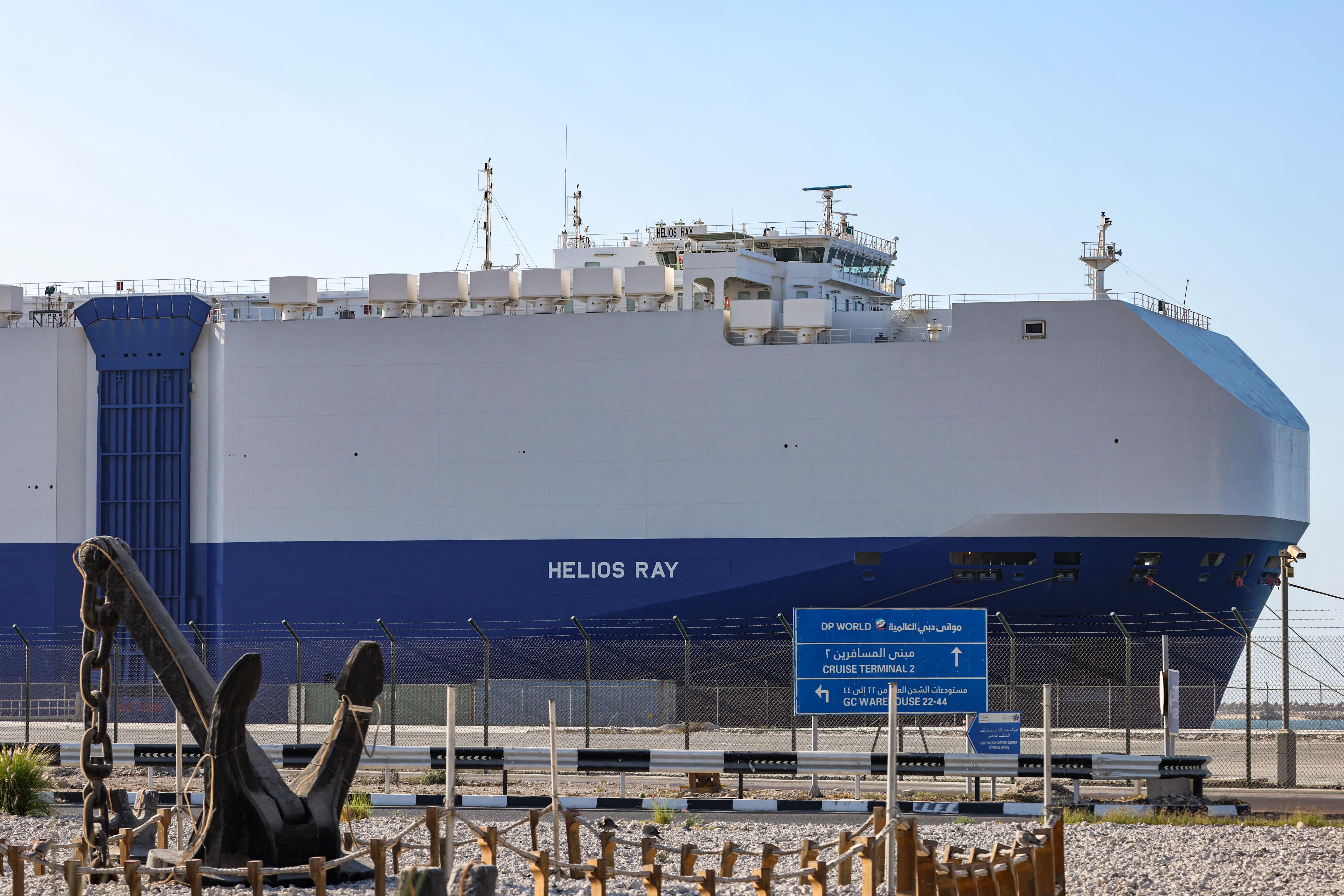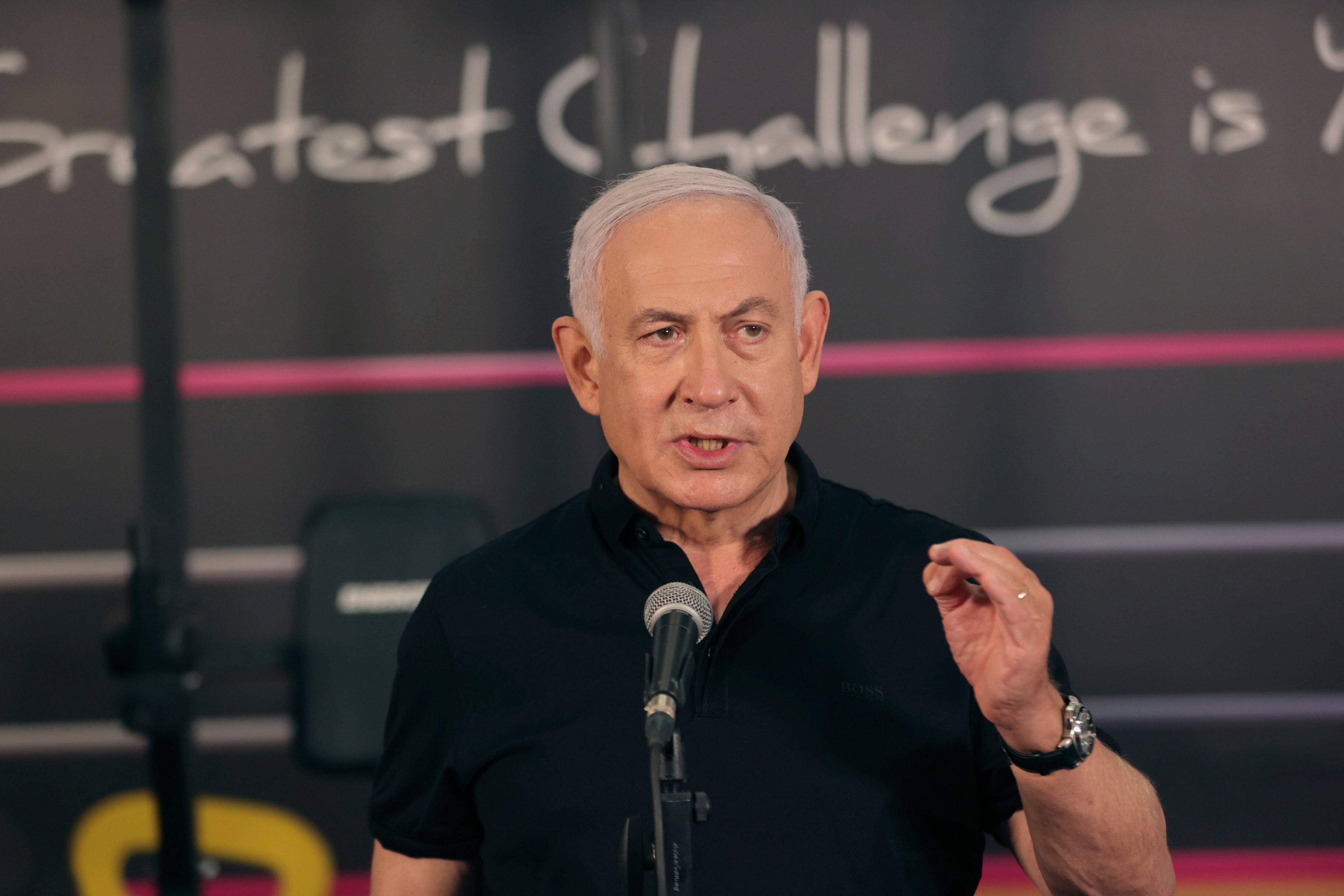The target: an Israeli-owned commercial ship at sea. The culprit: Iran, says Netanyahu
Iran denied any involvement in damage caused to the MV Helios Ray

Your support helps us to tell the story
From reproductive rights to climate change to Big Tech, The Independent is on the ground when the story is developing. Whether it's investigating the financials of Elon Musk's pro-Trump PAC or producing our latest documentary, 'The A Word', which shines a light on the American women fighting for reproductive rights, we know how important it is to parse out the facts from the messaging.
At such a critical moment in US history, we need reporters on the ground. Your donation allows us to keep sending journalists to speak to both sides of the story.
The Independent is trusted by Americans across the entire political spectrum. And unlike many other quality news outlets, we choose not to lock Americans out of our reporting and analysis with paywalls. We believe quality journalism should be available to everyone, paid for by those who can afford it.
Your support makes all the difference.Israel and Iran have traded sharp accusations over a 26 February attack on a transport ship owned by an Israeli businessman, among the latest in a series of provocations by both countries targeting each others’ assets, interests and personnel.
The explosions that struck the Bahamian-flagged MV Helios Ray damaged the giant vehicle carrier’s hull as it transited from Saudi Arabia to Singapore but caused no injuries or deaths, according to Israeli media accounts.
The explosions were “indeed an action of Iran, that is clear,” Israeli Prime Minister Benjamin Netanyahu told Israeli radio. He cited no evidence.
There was confusion over the cause of the blasts, which damaged the hull of the ship in two places.
A preliminary investigation cited by Israeli media said the damage was caused by mines, but Israel’s Channel 13 News cited security officials who said they believed the ship was struck by two missiles.
Still later, a source cited by Channel 13 said the explosions were caused by explosive devices that were planted inside the ship while it was at port. Israeli cabinet minister Yoav Gallant told the news outlet Ynet that the blasts were caused by limpet mines set by “Iranian commandos.”
Iran denied it was behind the explosions, which took place in the Gulf of Oman not far from the Iranian coast.
"We not only strongly deny this accusation, we also reject Israel’s actions near our territories over the past couple of months and are monitoring them closely," Iran foreign ministry spokesman Saeed Khatibzadeh told reporters in Tehran on Monday. "The Persian Gulf and the Sea of Oman are Iran’s immediate security areas. We will not allow [Israel] to spread panic.”
Iran has a history of alleged attacks on Persian Gulf shipping, often targeting vessels transiting from Arabian Peninsula ports with mines and other explosive devices, and occasionally seizing ships and their crew on dubious grounds. The hardline Iranian newspaperKayhan crowed that Iran or its allies could very well have been behind the attack on the vessel, which it described as a “spy” ship. Mr Khatibzadeh dismissed the Kayhan report as “media speculation”.
The accusation against Iran comes amid a spike in tensions between Iran and its western-aligned adversaries in the region. Iran on Sunday declined a European-brokered offer to meet with United States officials in an effort to restore the nuclear deal that was abandoned by the administration of former President Donald Trump.
The attacks also come amid a simmering cycle of military and paramilitary escalation between Iran and Israel. Mr Netanyahu’s interview was broadcast a day after airstrikes widely attributed to Israel struck sites south of the capital of Syria associated with Iranian-backed armed groups, which Israeli sources cited by local media described as retaliation for the Helios Ray attack.
Security officials cited by Voice of Israel radio said they believed the alleged attack on the Helios Ray, which has docked in the port city of Dubai for repairs, was in retaliation for the November assassination of Iranian unclear scientist Mohsen Fakhrizadeh. Israel and the US were also believed to be behind a series of mishaps that struck Iranian missile and nuclear sites last year.
But Israel officials said the attack on the Helios Ray amounted to a terrorist attack on a civilian target. Security officials cited by Israeli radio said the attack on the ship “crossed a red line” and vowed retaliation.
“Iran is Israel’s greatest enemy,” Mr Netanyahu said in the radio interview. “I am determined to block it. We are striking it across the region.”

The Helios Ray is registered as owned by a company in the Isle of Man; a Tel Aviv-based company affiliated with the registration referred the Independent to a public relations firm that declined to respond to questions about the contents of the ship. “The case is currently under investigation by the competent authorities in the [United Arab Emirates],” said a statement by Stamco Ship Management. “We trust that the issues with the vessel are sorted quickly and she will get underway soon.”
Shipping experts say very little superficially identifies the Helios Ray as an Israeli target, and that anyone pinpointing it as such must have done their homework.
“Out of all the ships passing through there in a very crowded place, this ship does not [stand out],” said Yoruk Isik, a maritime tracker who operates the blog Bosphorus Observer.
“Someone really tracked this ship. There is no marking on the ship that identifies this ship in any way as associated with Israel. It sounds like Iranians are following up, and really sending a message with this ship.”



Join our commenting forum
Join thought-provoking conversations, follow other Independent readers and see their replies
Comments